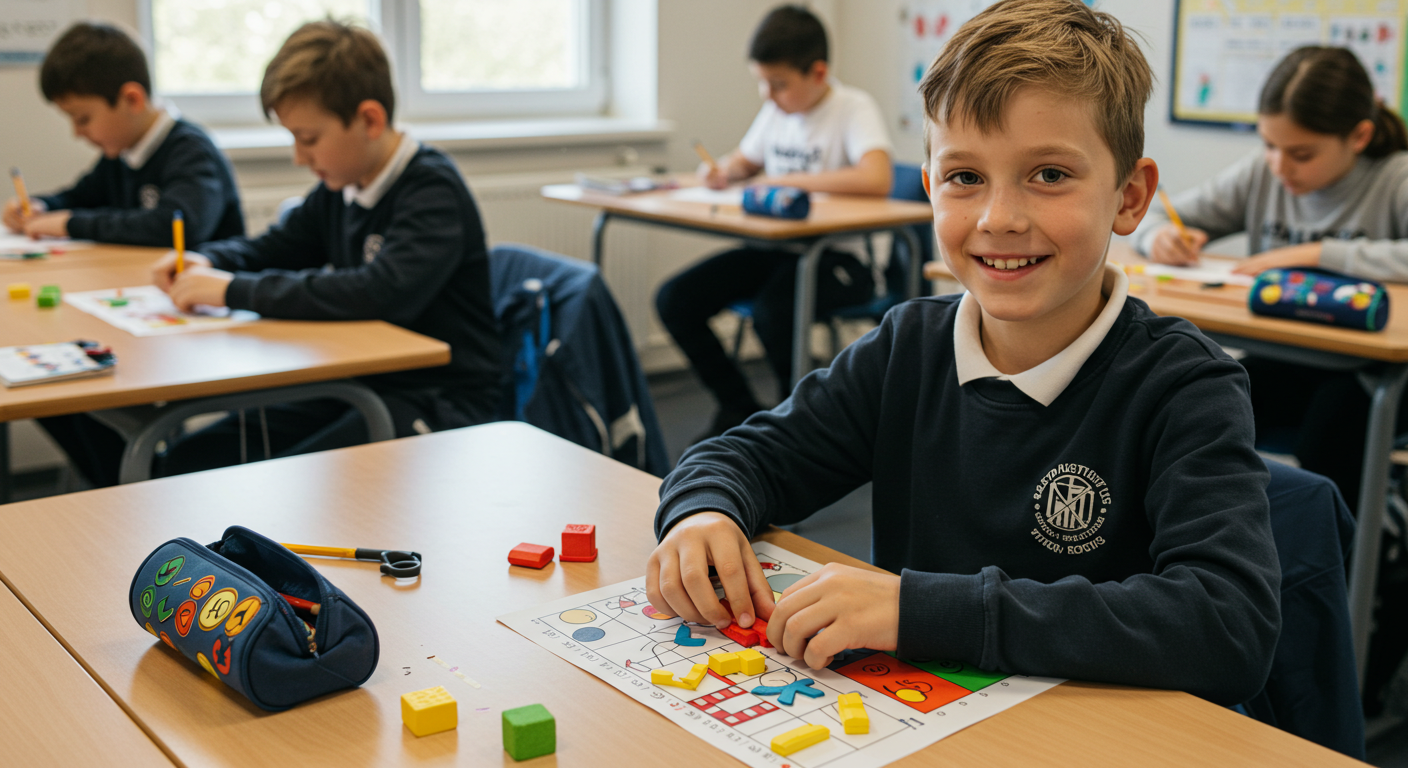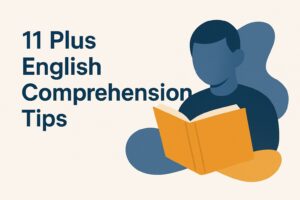
How Difficult Is the 11 Plus Compared to SATs?
If your child is approaching the end of Key Stage 2, you’re likely hearing about two different types of tests: the SATs and the 11 Plus. One is a national assessment of progress. The other could determine which school your child gets into.
Naturally, parents ask:
“How much harder is the 11 Plus compared to SATs?”
The short answer? The 11 Plus is significantly more challenging, but not just because of harder questions—it’s the unfamiliar formats, the time pressure, and the high stakes that set it apart.
Let’s break down the differences so you know exactly what to expect—and whether your child may need extra support to bridge the gap.
What Are the 11 Plus and SATs Actually Testing?

SATs: Measuring Curriculum Understanding
The SATs (Standard Assessment Tests) are designed to check how well a child has absorbed the Key Stage 2 National Curriculum. All Year 6 children in state schools take these in May. The subjects include:
-
English Reading
-
Spelling, Punctuation and Grammar (SPaG)
-
Maths – Arithmetic and Reasoning
The questions are based on content your child has been explicitly taught in class. That’s a key point: SATs assess learning that has already happened, making them more predictable and familiar.
They’re important for school records and teacher planning—but they don’t influence which secondary school your child attends.
11 Plus: Assessing Selection Potential
The 11 Plus is a selective entrance exam for grammar schools and some independent schools. The subjects tested can vary depending on your region and school type, but often include:
-
English comprehension
-
Maths (often more advanced than SATs)
-
Verbal reasoning
-
Non-verbal reasoning
-
Sometimes: creative writing or interview tasks
Unlike SATs, the 11 Plus often includes skills that aren’t taught in primary schools, especially reasoning. These tests are designed to assess potential, logic, and problem-solving—not just classroom knowledge.
That alone makes the 11 Plus more difficult. Children are expected to handle new types of questions, often without having seen anything similar before in school.
Key Differences That Make the 11 Plus More Challenging
Content Goes Beyond the KS2 Curriculum
SATs stick closely to the topics taught during primary education. The 11 Plus doesn’t. For example:
-
Verbal reasoning may include complex code-breaking or synonym/antonym logic
-
Non-verbal reasoning involves spotting visual patterns in shapes and diagrams
-
Maths may introduce algebra-style problems or multi-step word problems not covered in Year 6
For many children, these areas are completely new—and that makes them far more difficult without targeted preparation.
Time Pressure and Pacing
11 Plus exams are much more time-pressured than SATs. In some cases, students are expected to answer complex questions in under 30 seconds.
This can catch out even the brightest children, particularly if they:
-
Read slowly
-
Overthink
-
Struggle to move on from difficult questions
In contrast, SATs usually allow more time per question and are taken in a lower-stakes environment, often guided by familiar teachers.
No Second Chances
This might be the biggest difference of all.
-
SATs results are used for school performance data and to inform future teaching. They don’t impact your child’s school place.
-
11 Plus results, on the other hand, are one-shot and high-stakes. A poor performance can mean missing out on a place at your chosen grammar or selective school.
That pressure alone can make the 11 Plus feel harder—even if your child is academically capable.
Format and Question Styles Are Less Familiar
SATs are rehearsed extensively in school. Children are taught the format, question types, and even how to bubble in answers correctly.
The 11 Plus? Not so much.
Unless your child is being prepared outside of school, they may:
-
Never have seen a reasoning question
-
Struggle to understand abstract question instructions
-
Panic when faced with unknown formats under tight timing
The unfamiliarity alone increases the challenge—and that’s before you add the difficulty level itself.
How Do Students Typically Feel About Each?

For many Year 6 pupils, SATs feel familiar. They’ve been gradually exposed to SAT-style questions from Year 5 onwards, and schools typically run revision programmes in the lead-up to test week. Children often practise SATs-style papers in class, and their teachers walk them through the expectations. By the time the real tests arrive, they know the structure, pace, and tone.
The 11 Plus feels very different.
Many children encounter verbal reasoning or non-verbal reasoning for the first time outside of school—often in tutoring sessions or prep books at home. These formats don’t appear in the national curriculum, and there’s no classroom safety net. The unfamiliarity alone can be intimidating, and children often feel less confident going in.
Then there’s the emotional pressure. While SATs results don’t impact which secondary school your child attends, 11 Plus results do—and children pick up on that. It becomes a high-stakes test, and that emotional weight can make the experience feel significantly tougher.
Can a Child Who Does Well in SATs Succeed in the 11 Plus?
Strong SATs performance is a good indicator of literacy and numeracy skills, but it’s not enough on its own.
Here’s why:
-
SATs focus on curriculum knowledge: spelling, punctuation, arithmetic, comprehension.
-
The 11 Plus requires reasoning, logic, and fast thinking, especially in the verbal and non-verbal sections.
-
SATs don’t include timed abstract logic problems or complex multi-step puzzles.
-
Children who excel in SATs may still struggle with 11 Plus question styles if they haven’t encountered them before.
In short, a bright child can do well in both—but success in one doesn’t guarantee readiness for the other. Targeted preparation for the 11 Plus is essential, even for academically strong students.
Should Parents Worry About the Gap?

Worry? No. But ignore it? Also no.
Many children successfully make the leap from SATs-level learning to 11 Plus readiness. The key lies in recognising the gap early and addressing it gradually. With the right approach, it’s entirely possible to:
-
Introduce unfamiliar reasoning formats gently
-
Build exam confidence without stress
-
Teach pacing strategies for time-limited papers
-
Reinforce subject knowledge while improving adaptability
What makes the biggest difference isn’t natural ability—it’s how consistently and strategically you prepare. For an average or even high-achieving child, bridging the 11 Plus gap is entirely realistic with a well-planned structure.
Final Thoughts: Yes, the 11 Plus Is Harder—But It’s Not Impossible

There’s no question: the 11 Plus is more difficult than the SATs. It asks more of your child in less time, across less familiar ground, with far greater consequences.
But difficulty doesn’t mean it’s out of reach. With time, targeted prep, and support that builds confidence rather than pressure, many children grow into the challenge.
If your child has done well in SATs—or even just shown progress—they’re already demonstrating the raw skills the 11 Plus looks for. What matters next is giving them the tools to apply those skills under new conditions.
Preparation levels the playing field. And with the right support, the 11 Plus becomes not just achievable—but a powerful step forward.
Frequently Asked Questions
Is the 11 Plus harder than SATs?
Yes, the 11 Plus is widely considered more difficult than SATs. It includes unfamiliar content like verbal and non-verbal reasoning, faster time limits, and higher stakes. Unlike SATs, the 11 Plus often tests logic and potential—not just curriculum knowledge.
Do SATs prepare my child for the 11 Plus?
SATs help build strong English and maths fundamentals, but they don’t cover reasoning skills or exam strategy under pressure. While SATs success is a positive sign, your child will still need targeted preparation for the 11 Plus.
What’s the biggest difference between the 11 Plus and SATs?
The biggest differences are in format, content, and pressure. SATs are based on what’s taught in school and taken by all students. The 11 Plus includes logic-based sections that aren’t taught in class and is used to decide entry to selective schools.
Can my child pass the 11 Plus if they only focus on SATs?
It’s unlikely. The 11 Plus covers topics and formats that SATs don’t touch. If your child is only practising SATs-style questions, they may struggle with unfamiliar 11 Plus sections like non-verbal reasoning or advanced multi-step maths.
How much harder is the 11 Plus compared to SATs?
The 11 Plus is harder in both content and format. Children face stricter time limits, more complex reasoning, and higher stakes. The questions require problem-solving and quick thinking—skills that go beyond what’s taught in the national curriculum.



